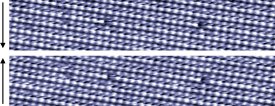Asylum Research, the technology leader in scanning probe and atomic force microscopy (SPM/AFM) announced today that its revolutionary Cypher AFM is routinely achieving resolution of atomic-scale point defects in liquid.
While scanning tunneling microscopes have routinely demonstrated point defect resolution since their invention, this gold standard of true atomic resolution has been more elusive in AFM. Many commercial AFMs can routinely image atomic lattices in ambient and liquid conditions, but the lack of point defects has led most researchers to conclude that the contact areas are typically several atoms across.
 Successive AC mode topography images of the cleavage plane of a calcite crystal in water. The repeated point defects demonstrate the true atomic resolution capabilities of the Cypher AFM. Arrows indicate scan direction. Scan size 20nm; Z scale 3.2Å; Cantilever Amplitude 4Å; Cantilever Frequency 454 kHz.
Successive AC mode topography images of the cleavage plane of a calcite crystal in water. The repeated point defects demonstrate the true atomic resolution capabilities of the Cypher AFM. Arrows indicate scan direction. Scan size 20nm; Z scale 3.2Å; Cantilever Amplitude 4Å; Cantilever Frequency 454 kHz.
More recently, instrumental improvements have brought true atomic resolution to ultra-high vacuum (UHV) AFM. Achieving true-atomic resolution under ambient conditions at the liquid-solid interface brings this resolution to an environment highly relevant for much practical research. The Cypher AFM's industry best signal-to-noise and support for ultra-small probes have enabled this breakthrough in atomic scale imaging.
Commented Jason Cleveland, Asylum Research CEO, "This raises the bar on what people should expect in terms of AFM resolution. Some AFM companies are renaming modes that have been around for years -such as frequency modulation or force volumes- and re-introducing them as "new" modes. Asylum Research has a different approach. We took the most popular imaging mode, AC-mode (also known as tapping, intermittent-contact, or dynamic AFM), kept the name and improved the resolution. The proof is in the images. Prior to this, no other commercial AFM has demonstrated resolution at this level."
Several technological advancements make this atomic scale imaging achievement possible:
- First is the improved signal-to-noise ratio from the use of ultra-small cantilevers with megahertz resonant frequencies in liquid, a capability unique to Asylum's state-of-the-art Cypher AFM.
- Second, the optical lever detection noise floor has been pushed to 25 fm/rtHz, allowing the measurements to remain thermally limited even with very stiff cantilevers and amplitudes as small as 1 Angstrom. These two improvements allow operation with stiff cantilevers and tiny amplitudes, allowing gentle enough imaging that true atomic-sized contact areas are possible.
- Finally, Cypher's exceptionally low open-loop noise of 5pm in X, Y, and Z allows the stability to image at this scale, even on a scanner with a 30µm lateral range.